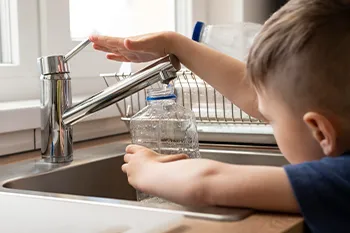Living in an area with hard water can present a series of challenges for homeowners, particularly when it comes to bathroom maintenance. At ToiletKing, we understand how hard water can affect your toilets and the overall hygiene of your bathroom. This article explores the effects of hard water on toilets and provides practical solutions to manage and mitigate these issues.
Understanding Hard Water and Its Effects
Hard water contains high levels of minerals such as calcium and magnesium. While these minerals are not harmful to health, they can have several detrimental effects on household appliances and plumbing fixtures, including toilets.
- Mineral Buildup: Over time, the minerals in hard water can deposit on the surfaces of your toilet, leading to unsightly limescale buildup. This not only affects the appearance but can also reduce the efficiency of your toilet by clogging the rinse holes and affecting the flushing mechanism.
- Staining: Hard water can leave stubborn stains on porcelain, which are difficult to remove with regular cleaning. These stains can give your toilet a perpetually dirty look and require specific cleaning techniques to eliminate.
- Increased Wear and Tear: The constant deposition of minerals can accelerate the wear and tear on your toilet’s internal components, such as the flapper and fill valve, potentially leading to more frequent repairs or replacements.
Effective Cleaning Solutions for Hard Water Stains
Managing hard water stains and buildup requires a proactive approach to cleaning. Here are some effective methods to keep your toilet looking clean and functioning properly:
- Vinegar and Baking Soda: A natural cleaning solution of vinegar and baking soda can be effective in removing hard water stains. Apply the mixture to the affected areas and let it sit for several hours or overnight before scrubbing with a toilet brush.
- Commercial Cleaners: There are several commercial cleaners designed specifically for hard water stains. Look for products containing ingredients that can break down mineral deposits. Be sure to follow the manufacturer’s instructions to avoid damaging the porcelain.
- Pumice Stones: For stubborn stains, a pumice stone can be used gently on porcelain surfaces. This method should be used sparingly, as frequent use can scratch the surface.
Preventative Measures to Combat Hard Water
In addition to regular cleaning, there are several preventative measures you can take to minimize the impact of hard water on your toilets:
- Water Softeners: Installing a whole-house water softener is one of the most effective ways to combat hard water. Water softeners remove minerals from the water before they can accumulate in your plumbing and on your appliances.
- Toilet Bowl Filters: Some products attach to the toilet’s feed line and filter out minerals from the water entering the tank. This can help reduce limescale buildup inside the toilet.
- Regular Maintenance: Regularly check and clean the rinse holes and siphon jets to ensure they are free from mineral blockages. This helps maintain the flushing efficiency of your toilet.
When to Consider Toilet Replacement
If your toilet is frequently experiencing issues due to hard water or if it’s older and less water-efficient, it might be time to consider a replacement. Upgrading to a modern toilet designed to handle hard water effectively can save you time and money in the long run.
Partnering with ToiletKing
At ToiletKing, we specialize in providing top-quality toilet replacement services tailored to your specific needs. Whether you’re dealing with hard water damage or simply looking to upgrade your bathroom, our expert team is here to ensure a smooth and hassle-free installation process. We offer a range of toilets that are designed to resist hard water effects, maintaining their efficiency and appearance over time.
If you’re facing hard water issues in your bathroom or considering an upgrade, contact us today. Let ToiletKing help you find the perfect solution to keep your bathroom functioning beautifully and efficiently.


